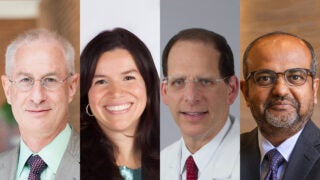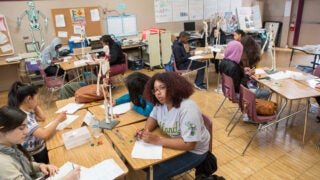Philosophy underscores graduating senior’s drive to serve others
Vivek Shah will graduate from USC Dornsife with bachelor’s degrees in biochemistry and philosophy setting a foundation for his future in medicine
For Vivek Shah, education is a gift to be cherished and a tool to be wielded in the service of others.
The senior, who will graduate this May with a double major in biochemistry and philosophy from the USC Dornsife College of Letters, Arts and Sciences, has constructed his undergraduate career around the precept instilled in him by his immigrant mother: “Your goal is to use your education to help those people who didn’t have the opportunity to get their own.”
Shah’s mother, Jigna Shah, and his father, Vilas Shah, came to the United States in the 1990s from the Indian state of Gujarat. They eventually settled in Chino, where they raised Vivek Shah and his younger brother.
His father is an accountant. His mother, Shah said, dreamed of working in medicine, but various setbacks, including the effort to raise her young children, kept her on a different career path; she’s now the manager of an engineering firm.
Shah, 21, keeps her in mind as he tries not to take any opportunity for granted. He’s studded the last four years of classroom learning with stints in the research lab and forays into the community, trying to extend his increasing knowledge and help the world. Well, that and he’s just interested in many, many things.
“I came to USC because I think it’s the best place for someone like me who wants to do 1 million things and still be prepared” for life after college, he said.
USC double major: biochemistry and philosophy
The 1 million things start with his choice of major — or, rather, majors. The first one, biochemistry, was an easy pick for someone who wants to become a physician. (Shah will begin medical school at UCLA in the fall.) But the second major, philosophy, was a surprise even to him.
I was always interested in philosophy without really knowing what it was.
Vivek Shaw
“I was always interested in philosophy without really knowing what it was,” he said. As a child, he loved to puzzle over the questions a favorite uncle would pose: Does the brain have limited space? Are people’s actions inherently good?
Then, after he arrived at USC Dornsife, he took an introductory ethics course with Jacob Ross, associate professor of philosophy. “I was hooked,” he said. He realized he could make his education “not just pre-professional development, but personal development, too.”
That understanding extended into his time outside of campus. Over winter break of his freshman year, Shah volunteered with USC Medlife, heading down to Peru to work for a week at a medical clinic. The next year he was back, this time as brigade coordinator. Later, as a junior, he helped start the USC Mobile Clinic, which brings together a team of undergraduates, medical school students and health care professionals to provide care to the city’s homeless. He’s also served on the events coordination team of the Inter-Health Council, which connects pre-health organizations at the university.
Tied together by philosophy
On the research front, Shah did chemical biology research in the lab of Chao Zhang, associate professor of chemistry and biological sciences. That work included publishing a paper in the Journal of the American Chemical Society in May 2017 describing research that attempted to lay a roadmap for “how certain cellular pathways work,” Shah said.
Since the second semester of his junior year, he’s also been involved in health policy research with Neeraj Sood, professor and vice dean for research at the USC Price School of Public Policy and director of research at the Leonard D. Schaeffer Center for Health Policy and Economics. The work examined how well area hospitals are meeting the Affordable Care Act’s mandate to partner with the surrounding community.
These varied interests have come together in his senior honors thesis. With characteristic enthusiasm, Shah said of the project, “It’s been an exciting mix of learning about diseases, learning about health policy and then tying all that together with philosophy.”
Shah is interested in questions like, if a thousand people get headaches but one person is dying of AIDS, what is an equitable distribution of research and health care resources for those two conditions? “How can we make a system,” he said, “that takes care of as many people as possible and really respects the dignity and moral worth of every human being?”
And that comes back to his life’s goal: to become a physician and serve others.
“Yes, my undergraduate career is about learning and trying to develop myself,” he said, “but I don’t want to ever forget that the reason I’m doing all this is to help other people.”



